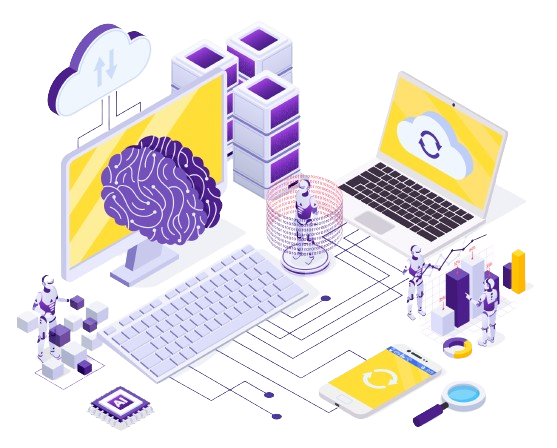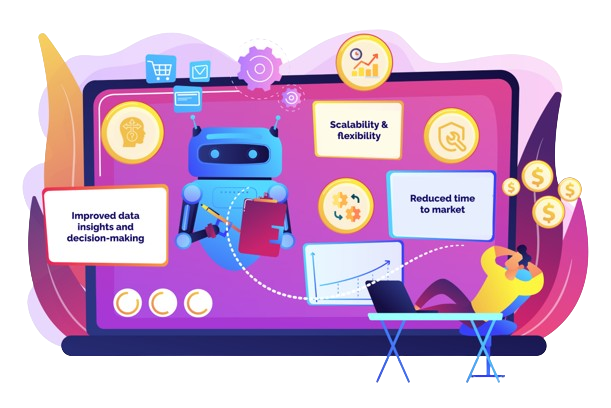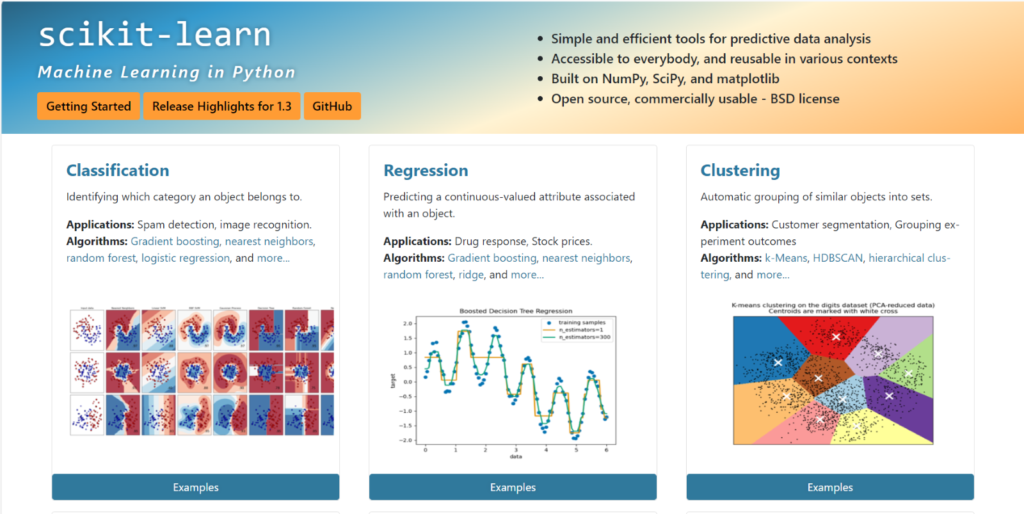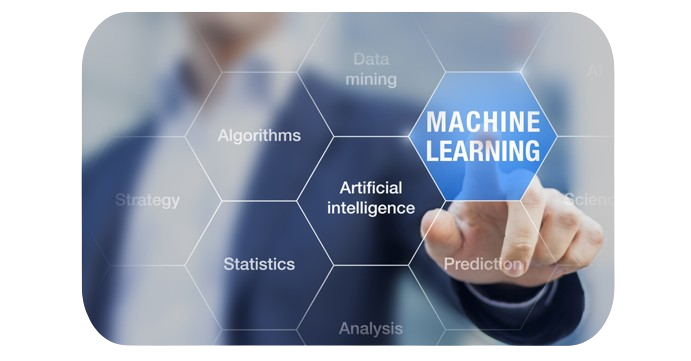What’s the impact of Machine Learning on cloud Computing?
Machine learning is rapidly transforming the cloud computing landscape. Cloud services are integrating ML algorithms, boosting data processing, amplifying analytics, and enabling never-before-seen real-world applications.

Integration of ML algorithms into cloud services
Cloud providers are increasingly integrating ML algorithms into their core services. For example, Amazon Web Services (AWS) offers a variety of ML services, such as SageMaker, Rekognition, and Comprehend. These services make it easy for businesses to develop and deploy ML models without having to invest in their own infrastructure and expertise.
Enhancing data processing and analytics in the cloud
Machine learning actively automates and optimizes many common data processing and analytics tasks, such as data cleaning, feature engineering, model training, and data visualization. This can help businesses to gain deeper insights from their data and make better decisions.
For example, a retail company can use ML to analyze customer transaction data to identify trends and patterns. This information can then be used to improve product placement, promotions, and marketing campaigns.
Cloud-based ML: Transforming Industries across the Board
Cloud-based machine learning (ML) is rapidly reshaping various industries, from enhancing customer experiences to revolutionizing healthcare and boosting manufacturing efficiency.
Retail:
Personalized Shopping: ML analyzes customer behavior to recommend products, predict preferences, and deliver tailored marketing campaigns. Imagine browsing an online store where products magically appear on your screen, perfectly aligned with your interests.
Fraud Detection: ML algorithms analyze vast amounts of data to identify and prevent fraudulent transactions, safeguarding both businesses and customers. Imagine online shopping with complete peace of mind, knowing your financial information is protected by cutting-edge ML technology.
Healthcare:
Personalized Treatment Plans: ML helps healthcare professionals analyze patient data and develop personalized treatment plans for optimal outcomes. Imagine receiving medical care tailored specifically to your unique needs and health history.
Disease Diagnosis: ML algorithms analyze medical images like X-rays and MRI scans to detect diseases with high accuracy, leading to earlier diagnoses and improved treatment outcomes. Imagine getting a clear diagnosis quickly and confidently, allowing you to focus on getting better.
Manufacturing:
Predictive Maintenance: ML identifies potential equipment failures before they occur, preventing costly downtime and ensuring smooth production. Imagine a manufacturing facility where machines are meticulously monitored and maintained, preventing costly disruptions.
Process Optimization: ML analyzes production data to identify and optimize processes, leading to increased efficiency, reduced waste, and improved quality. Imagine a manufacturing process constantly improving, producing more with less while minimizing waste.
Finance:
Fraud Detection: ML algorithms analyze financial transactions to identify and prevent fraudulent activities, protecting financial institutions and their clients. Imagine banking with the confidence that your financial security is constantly being monitored by sophisticated ML systems.
Advantages and benefits of Cloud-based ML

Improved data insights and decision-making:
ML can help businesses to gain deeper insights from their data and make better decisions. For example, a healthcare provider can use cloud-based ML to analyze patient data from a variety of sources, such as electronic health records (EHRs), medical images, and wearable devices.This data actively unlocks patterns and trends that would be impossible to detect manually. Imagine identifying patients most likely to develop a specific disease or respond favorably to a particular treatment – all through the power of ML.
Enhanced automation and efficiency:
ML can automate and optimize many common data processing and analytics tasks, freeing up employees to focus on more strategic work. For example, ML can be used to automate tasks such as data cleaning, feature engineering, and model training. This can free up data scientists to focus on more complex tasks such as developing new ML models and interpreting the results of ML models.
Scalability and flexibility:
Cloud-based ML solutions are scalable and flexible, making it easy to add or remove resources as needed. This is especially beneficial for businesses with seasonal demand or fluctuating workloads. For example, a healthcare provider can use cloud-based ML to scale its patient data analysis and risk prediction capabilities to support its growing patient population.
Cost savings:
Cloud-based ML can help businesses to save money on IT costs. Businesses can avoid the need to invest in their own hardware and software, and they can pay for cloud resources on a pay-as-you-go basis.
Save money:
- Reduce IT infrastructure costs: Cloud-based ML eliminates the need to invest in and maintain on-premises hardware and software. This can save businesses a significant amount of money, especially for large enterprises with complex IT infrastructures.
- Reduce data storage costs: Cloud-based ML platforms typically offer a range of storage options, including object storage and archival storage. This allows businesses to store their data at a lower cost than they would be able to achieve on-premises.
Reduced time to market:
Cloud-based ML can help businesses to reduce the time to market for new products and services. By leveraging the power of cloud computing, businesses can quickly and easily deploy ML models to production.
Reduce time to market:
- Accelerate ML model development: Cloud-based ML platforms provide a range of tools and services that can help businesses develop and deploy ML models faster. These tools can automate tasks such as data preprocessing, feature engineering, and model training.
- Simplify ML model deployment: Cloud-based ML platforms make it easy to deploy ML models to production. Businesses can deploy models with just a few clicks, and they can easily monitor and manage their models in production.
- Enable continuous integration and continuous delivery (CI/CD): Cloud-based ML platforms can be integrated with CI/CD pipelines. This allows businesses to automate the process of building, testing, and deploying ML models.
Access to a wide range of ML tools and services:
Cloud providers offer a wide range of ML tools and services, including pre-trained models, ML frameworks, and ML development environments. This makes it easy for businesses to get started with ML, even if they don’t have in-house ML expertise.
Access a wide range of ML tools and services:
- Pre-trained models: Cloud-based ML platforms offer a wide range of pre-trained models that businesses can use to solve common ML problems. These models can save businesses a lot of time and effort, as they don’t need to train their own models from scratch.
- ML frameworks: Cloud-based ML platforms support a variety of popular ML frameworks, such as TensorFlow, PyTorch, and scikit-learn. This gives businesses a lot of flexibility when choosing the tools they use to develop and deploy ML models.

- ML development environments: Cloud-based ML platforms provide integrated development environments (IDEs) that make it easy to develop and test ML models. These IDEs typically include code editors, debuggers, and other tools that can help businesses develop high-quality models
Improved security and compliance:
Cloud providers offer a variety of security measures to protect ML algorithms and data. This includes encryption of data at rest and in transit, access control and authentication, auditing and monitoring, and isolation of workloads. Cloud providers also offer compliance certifications to meet the regulatory requirements of different industries.
Collaboration:
Cloud-based ML makes it easy for businesses to collaborate on ML projects. Multiple users can access and work on the same ML models in real time. This can help businesses to accelerate ML development and innovation.
Innovation:
Cloud-based ML is constantly evolving as new ML algorithms, tools, and services are developed. Cloud providers are also investing heavily in research and development to improve the performance and efficiency of ML algorithms. This means that businesses can adopt new ML innovations quickly and easily.
The integration of ML and cloud computing is expected to continue to accelerate in the coming years. This will lead to the development of even more innovative and transformative applications.
Here are some real-world examples of how businesses are using cloud-based ML to stay ahead of the competition:
- Netflix: Netflix uses cloud-based ML to personalize recommendations for its users. This helps Netflix to keep its users engaged and to reduce churn.
- Airbnb: Airbnb uses cloud-based ML to optimize its pricing algorithms. This helps Airbnb to maximize its revenue and to minimize its vacancy rates.
- Uber: Uber uses cloud-based ML to predict demand for rides. This helps Uber to allocate its resources more efficiently and to improve the customer experience.
Trends Shaping the Future Landscape

Advancements in ML and cloud integration: Cloud providers are investing heavily in research and development to improve the integration of ML and cloud computing. This is leading to the development of new tools and services that make it easier for businesses to build and deploy ML models.
Emerging technologies shaping the landscape: Emerging technologies such as artificial intelligence (AI), 5G, and the Internet of Things (IoT) are also having a significant impact on the ML-driven cloud computing landscape. These technologies are creating new opportunities for businesses to collect and analyze data, and to develop and deploy ML models in real time.
ML is having a transformative impact on cloud computing. By automating and optimizing data processing and analytics, and enabling new and innovative real-world applications, ML is helping businesses to improve their efficiency, productivity, and decision-making. The integration of ML and cloud computing is expected to continue to accelerate in the coming years, leading to the development of even more transformative applications.
Explore how CEI’s comprehensive IT infrastructure services can ensure your systems are optimized and secure to support your cloud-based ML initiatives. Learn more about our IT infrastructure services.
